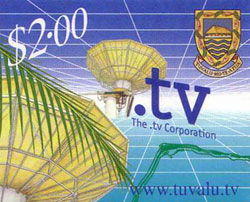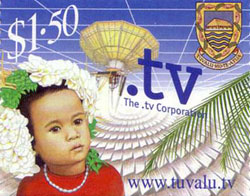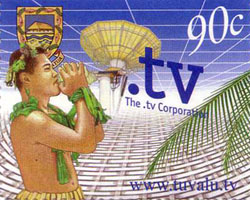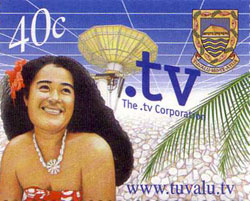Staying Afloat: Tuvalu's Dot TV Domain
The Tuvalu Series > Fongafale > Dot Tv > Fairy Tale > The End of the World
To the Captain, advances in communication often comprise a hostess, a vinyl sofa, and a quick sneak of his hand along her backside - all this while balancing his cigarette and a gin and tonic.
 But this week he's taking a bit of a technological approach. Join him on the island nation of Tuvalu, where he's taking a peek at the future of telecommunications by studying Internet domain registrations. Keep reading, folks, it is more interesting than it sounds...
But this week he's taking a bit of a technological approach. Join him on the island nation of Tuvalu, where he's taking a peek at the future of telecommunications by studying Internet domain registrations. Keep reading, folks, it is more interesting than it sounds...
A report released last week by the Intergovernmental Panel on Climate Change offered a harsh evaluation of the earth's environment. The rise in global temperatures since 1950, the study said, is "very likely" attributable to human activity and has resulted in an "unequivocal" condition of global warming.
But for Tuvalu, a low-lying Pacific nation of nine narrow coral atolls perched precariously at the edge of perhaps rising waters, its approach in recent years for staying afloat has been more about solvency than sea levels. In late January, members of Tuvalu's Ministry of Communication & Transports traveled to Washington D.C., where it held meetings with VeriSign - the Internet infrastructure services company to which this alphabetically lucky Polynesian nation leases .tv, its country code Top Level Domain (ccTLD).
"Part of the agreement," said the ministry's permanent secretary, Tapugao Falefou, before his departure to Washington, "is that the government of Tuvalu is invited to come over to physically see the administration of .tv and to discuss mutual interests to both VeriSign and the government of Tuvalu."
 Once an example of dot-com excess, .tv is getting a second chance as interest in broadcasting video over the Internet has reached frenzied proportions - an opportunity that Tuvalu hopes will provide support to its isolated lands of 11,800 people facing an uncertain future.
Once an example of dot-com excess, .tv is getting a second chance as interest in broadcasting video over the Internet has reached frenzied proportions - an opportunity that Tuvalu hopes will provide support to its isolated lands of 11,800 people facing an uncertain future.
The deal allows VeriSign to register Internet domains ending in .tv, a desirable suffix to Web sites wishing to draw customers to their video and television content. Tuvalu receives a flat $550,000 per quarter regardless of the number of registrations.
Given that Tuvalu's GDP is roughly $15 million, the $2.2 million annual guarantee is substantial. The sale of fishing licenses and the interest generated from a multi-nation trust fund established in 1987 are other key sources. Former earners included the sale of postage stamps featuring international celebrities and famous events, for which revenue slumped following market saturation in the '70s, and the now abandoned practice of routing calls through Tuvalu's international access code for use by outside phone-sex operators.
In addition, a commission kicks in when a certain revenue threshold for .tv has been reached, but since the agreement's inception five years ago Tuvalu has not received a cent.
"There have been a number of efforts to reduce the threshold so we can receive something," Falefou said, declining to reveal the exact value.
 But negotiations have been hampered on two fronts: one, a lack of transparency on the part of VeriSign doesn't not allow Tuvalu to scrutinize the revenue figures, and two, Tuvalu, a nation of marine-based subsistence living separated from Fiji by a two-hour plane ride, doesn't have the technical expertise to actually understand the potential revenue generated by .tv.
But negotiations have been hampered on two fronts: one, a lack of transparency on the part of VeriSign doesn't not allow Tuvalu to scrutinize the revenue figures, and two, Tuvalu, a nation of marine-based subsistence living separated from Fiji by a two-hour plane ride, doesn't have the technical expertise to actually understand the potential revenue generated by .tv.
To shrink the tech gap, Tuvalu has been sending one student to Washington each year to receive training for 12 months. But with improvements in download speeds fueling a surge in demand for Internet video content, as evidenced by the sale of video-sharing site YouTube to Google last year for $1.6 billion, Falefou knows that greater accountability is needed.
"We must have an independent body oversee the process," Falefou said, "because there might be millions and millions of dollars being generated by .tv without our knowledge."
Tuvalu's Internet venture got off to a dubious start in 1998 with the initial licensing of .tv to the Toronto company Information.ca.Corp. Headed by Jason Chapnik, the company estimated annual returns for Tuvalu to approach $100 million a year. When such sums did not appear, Pasadena-based Internet venture firm Idealab, known primarily for having launched eToys, interceded in 2000 and formed dotTV Corporation, which inked a contract with Tuvalu promising $50 million over 12 years and granting it a small stake in the company. The conversion of a stock option worth $12.5 million went straight into Tuvalu's coffers.
 Among other benefits, the initial cash was used for tar-sealing a formerly crushed-coral road extending the length of its most populous island, Fongafale, on the atoll Funafuti and for the budgetary dues necessary for entry to the United Nations in late 2000. The issuance of a series of postage stamps, featuring Tuvaluans sporting traditional skirts and floral head decorations with a satellite dish and the dotTV logo looming in the background, commemorated the windfall.
Among other benefits, the initial cash was used for tar-sealing a formerly crushed-coral road extending the length of its most populous island, Fongafale, on the atoll Funafuti and for the budgetary dues necessary for entry to the United Nations in late 2000. The issuance of a series of postage stamps, featuring Tuvaluans sporting traditional skirts and floral head decorations with a satellite dish and the dotTV logo looming in the background, commemorated the windfall.
Sensing interest in .tv to be on the wane right along with the fizzle in the Internet boom, which once yielded annual fees of over $1,000 for generic-word domains like cars.tv and business.tv, dotTV was sold in 2002 to VeriSign for $45 million.
The three-storey government building that houses Falefou's office is perhaps the country's highest structure. With sea levels theoretically creeping higher, few on sleepy Funafuti, whose typical width from lagoon to sea is often less than that of a football field, care to imagine the future. But equally unimaginable is a source of funds due to a quirk brought about by a pair of letters.
Though the non-profit Internet Corporation for Assigned Names and Numbers (ICANN) places .com and .net as the top domains of the over 80 million across the Internet - with .tv not even ranking in the first six slots - VeriSign has told Tuvalu that .tv is becoming more popular.
 In December, VeriSign announced a partnership with Demand Media. Headed by Richard Rosenblatt, the former chairman of networking site MySpace, the firm plans to market .tv as a prime location for personal video-sharing "channels" and as the preferred domain for online video sites - a connection that, Demand Media hopes, will be the first step in the eventual convergence of domain names and media. Tom Gardner, co-founder of the Motley Fool personal investment Web site, predicted at the T.R.A.F.F.I.C. East 2006 Domain Conference in Hollywood, Florida last October that .tv would be a domain to watch in 2007.
In December, VeriSign announced a partnership with Demand Media. Headed by Richard Rosenblatt, the former chairman of networking site MySpace, the firm plans to market .tv as a prime location for personal video-sharing "channels" and as the preferred domain for online video sites - a connection that, Demand Media hopes, will be the first step in the eventual convergence of domain names and media. Tom Gardner, co-founder of the Motley Fool personal investment Web site, predicted at the T.R.A.F.F.I.C. East 2006 Domain Conference in Hollywood, Florida last October that .tv would be a domain to watch in 2007.
Sound like another bubble? Falefou doesn't know. But he does think that this is Tuvalu's chance.
"The development of the technology was the thing that the people who originally bought .tv couldn't work out," Falefou said. "The technology wasn't that advanced then. But it is now."
The Tuvalu Series > Fongafale > Dot Tv > Fairy Tale > The End of the World

